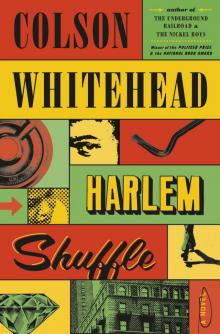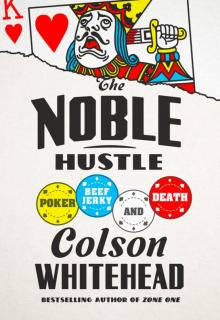- Home
- Colson Whitehead
The Underground Railroad Page 9
The Underground Railroad Read online
Page 9
“And the slaves?” Cora asked. She did not understand the money talk, but she knew people being sold as property when she heard it.
“They get food, jobs, and housing. Come and go as they please, marry who they wish, raise children who will never be taken away. Good jobs, too, not slave work. But you’ll see soon enough.” There was a bill of sale in a file in a box somewhere, from what he understood, but that was it. Nothing that would be held over them. A confidante in the Griffin Building had forged these papers for them.
“Are you ready?” Sam asked.
Caesar and Cora looked at each other. Then he extended his hand like a gentleman. “My lady?”
She could not prevent herself from smiling, and they stepped into the daylight together.
The government had purchased Bessie Carpenter and Christian Markson from a bankruptcy hearing in North Carolina. Sam helped them rehearse as they walked to town. He lived two miles outside, in a cottage his grandfather had built. His parents had operated the copper shop on Main Street, but Sam chose a different path after they died. He sold the business to one of the many transplants who’d come to South Carolina for a fresh start and Sam now worked at one of the saloons, the Drift. His friend owned the place, and the atmosphere suited his personality. Sam liked the spectacle of the human animal up close, as well as his access to the workings of the town, once the drink loosened tongues. He made his own hours, which was an asset in his other enterprise. The station was buried beneath his barn, as with Lumbly.
At the outskirts Sam gave them detailed directions to the Placement Office. “And if you get lost, just head for that”—he pointed at the skyscraping wonder—“and make a right when you hit Main Street.” He would contact them when he had more information.
Caesar and Cora made their way up the dusty road into town, unbelieving. A buggy rounded the turn and the pair nearly dove into the woods. The driver was a colored boy who tipped his cap in a jaunty fashion. Nonchalant, as if it were nothing. To have such bearing at his young age! When he was out of sight they laughed at their ridiculous behavior. Cora straightened her back and held her head level. They would have to learn how to walk like freemen.
In the following months, Cora mastered posture. Her letters and speech required more attention. After her talk with Miss Lucy, she removed her primer from her trunk. While the other girls gossiped and said good night one by one, Cora practiced her letters. The next time she signed for the Andersons’ groceries, she would write Bessie in careful print. She blew out the candle when her hand cramped.
It was the softest bed she had ever lain in. But then, it was the only bed she had ever lain in.
Miss Handler must have been raised in the bosom of saints. Even though the old man was utterly incompetent with regards to the rudiments of writing and speaking, the teacher was never less than polite and indulgent. The entire class—the schoolhouse was full on Saturday mornings—shifted at their desks while the old man sputtered and choked on the day’s lessons. The two girls in front of Cora made cross-eyes at each other and giggled at his botched sounds.
Cora joined the class in exasperation. It was nigh impossible to understand Howard’s speech under normal circumstances. He favored a pidgin of his lost African tongue and slave talk. In the old days, her mother had told her, that half language was the voice of the plantation. They had been stolen from villages all over Africa and spoke a multitude of tongues. The words from across the ocean were beaten out of them over time. For simplicity, to erase their identities, to smother uprisings. All the words except for the ones locked away by those who still remembered who they had been before. “They keep ’em hid like precious gold,” Mabel said.
These were not her mother’s and grandmother’s times. Howard’s attempts at “I am” consumed precious lesson time, already too short after the work week. She had come here to learn.
A gust sent the shutters wheezing on their hinges. Miss Handler put down her chalk. “In North Carolina,” she said, “what we are doing is a crime. I would be fined a hundred dollars and you would receive thirty-nine lashes. That’s from the law. Your master would likely have a more severe punishment.” The woman met Cora’s eyes. The teacher was only a few years older than her but she made Cora feel like an ignorant pickaninny. “It’s hard to start from nothing. A few weeks ago, some of you were where Howard is now. It takes time. And patience.”
She dismissed them. Chastened, Cora snatched up her things, wishing to be the first one out the door. Howard wiped his tears with his sleeve.
The schoolhouse lay south of the rows of girls’ dormitories. The building was also used for meetings in need of a more serious atmosphere than that of the common rooms, Cora noticed, such as the assemblies on hygiene and feminine matters. It looked out on the green, the colored population’s park. Tonight one of the bands from the men’s dormitory was playing in the gazebo for the social.
They deserved Miss Handler’s scolding. South Carolina maintained a different attitude toward colored progress, as Sam had told Cora on the platform. Cora had savored this fact in a multitude of ways over the months, but the provision for colored education was among the most nourishing. Connelly once put out a slave’s eyes for looking at words. He lost Jacob’s labor, though if the man had been talented the overseer would have subjected him to a less drastic punishment. In return he gained the eternal fear of any slave with a notion to learn his letters.
Don’t need eyes to shuck corn, Connelly told them. Or to starve yourself to death, as Jacob did presently.
She put the plantation behind her. She did not live there anymore.
A page slipped out of her primer and she chased it onto the grass. The book was falling apart, from her use and that of the previous owners. Cora had seen little children, ones younger than Maisie, use the same primer for their lessons. New copies with fresh spines. The ones from the colored schoolhouse were well-thumbed and she had to squeeze her letters above and in between other people’s scribblings, but there was no whipping attached just for looking at it.
Her mother would be proud of her. As Lovey’s mother was likely proud of her daughter for running away, for a day and a half. Cora replaced the page in her book. She pushed the plantation from her again. She was getting better at it. Her mind was wily though, twisty. Thoughts she did not like wormed in from the sides, from beneath, through the cracks, from places she had battened down.
Of her mother, for example. Her third week in the dormitory, she knocked on the door of Miss Lucy’s office. If the government kept records of all the colored arrivals, perhaps among the many names was that of her mother. Mabel’s life after her escape was an enigma. It was possible she was one of the freemen who came to South Carolina for the opportunities.
Miss Lucy worked in a room down the hallway from number 18’s common room. Cora did not trust her, yet there she stood. Miss Lucy admitted her. The office was cramped, with filing cabinets the proctor had to squeeze through to get to her desk, but she kept it pleasant with samplers on the walls detailing farming scenes. There was no room for a second chair. Visitors stood for their audience, which kept the visits short.
Miss Lucy regarded Cora over her glasses. “What’s her name?”
“Mabel Randall.”
“Your name is Carpenter,” Miss Lucy said.
“That my daddy’s name. My mother, she a Randall.”
“That is,” Miss Lucy said. “She is.”
She stooped before one of the cabinets and ran her fingers over the blue-tinted papers, glancing in Cora’s direction every so often. Miss Lucy had mentioned that she lived with a group of proctors in a boardinghouse near the square. Cora tried to picture what the woman did when she was not managing the dormitory, how she spent her Sundays. Did she have a young gentleman who took her places? How did an unattached white woman occupy herself in South Carolina? Cora was getting braver but still stuck close to the dormitories when not attending to the Andersons. It seemed prudent, those early days out of the tunnel.
Miss Lucy moved to another cabinet, tugging open a series of drawers, but came up empty. “These records are only of who’s here at our dormitories,” she said. “But we have locations all over the state.” The proctor wrote down her mother’s name and promised to check the master records in the Griffin Building. For the second time she reminded Cora of the lessons in reading and writing, which were optional but recommended, in keeping with their mission of colored uplift, especially for those with aptitude. Then Miss Lucy returned to her work.
It had been a whim. Once Mabel ran, Cora thought of her as little as possible. After landing in South Carolina, she realized that she had banished her mother not from sadness but from rage. She hated her. Having tasted freedom’s bounty, it was incomprehensible to Cora that Mabel had abandoned her to that hell. A child. Her company would have made the escape more difficult, but Cora hadn’t been a baby. If she could pick cotton, she could run. She would have died in that place, after untold brutalities, if Caesar had not come along. In the train, in the deathless tunnel, she had finally asked him why he brought her with him. Caesar said, “Because I knew you could do it.”
How she hated her. The nights without number she spent up in the miserable loft, tossing about, kicking the woman next to her, devising ways off the plantation. Sneaking into a cartload of cotton and leaping to the road outside New Orleans. Bribing an overseer with her favors. Taking her hatchet and running through the swamp as her wretched mother had done. All the sleepless nights. In the light of morning she convinced herself that her scheming had been a dream. Those were not her thoughts, not at all. Because to walk around with that in your mind and do nothing was to die.
She didn’t know where her mother had fled. Mabel hadn’t spent her freedom saving money to buy her daughter out of bondage, that was certain. Randall would not have allowed it, but nonetheless. Miss Lucy never did find her mother’s name in her files. If she had, Cora would have walked up to Mabel and knocked her flat.
“Bessie—you all right with yourself?”
It was Abigail from number 6, who came by for supper occasionally. She was friendly with the girls who worked on Montgomery Street. Cora had been standing in the middle of the grass, staring. She told Abigail everything was fine and returned to the dormitory to do her chores. Yes, Cora needed to keep better guard over her thoughts.
If Cora’s own mask was occasionally askew, she proved adept at maintaining the disguise of Bessie Carpenter, late of North Carolina. She had prepared herself for Miss Lucy’s question about her mother’s surname and for other tracks the conversation might have taken. The interview at the Placement Office that first day had concluded after a few brief questions. The newcomers had toiled either in the house or in the field. In either case, the majority of the openings were domestic work. The families were told to exercise forbearance with inexperienced help.
The doctor’s examination gave her a scare, but not on account of the questions. The gleaming steel instruments in the examination room looked like tools Terrance Randall might have ordered from the blacksmith for sinister purposes.
The doctor’s offices were on the tenth floor of the Griffin. She survived the shock of her first elevator ride and stepped into a long corridor lined with chairs, all of which were full of colored men and women awaiting examinations. After a nurse in a stark white uniform checked her name off a list, Cora joined the group of women. The nervous talk was understandable; for most, this was their first visit with a doctor. On the Randall plantation, the doctor was only called when the slave remedies, the roots and salves, had failed and a valued hand was near death. In most cases there was nothing for the doctor to do at that point but complain about the muddy roads and receive his payment.
They called her name. The window in the examination room granted her a view of the configuration of the town and the verdant countryside for miles and miles. That men had built such a thing as this, a stepping-stone to heaven. She might have stayed there all day, gazing at the landscape, but the examination cut short her reverie. Dr. Campbell was an efficient sort, a portly gentleman who buzzed around the room with his white coat flapping behind him like a cape. He probed about her general health as his young nurse recorded it all on blue paper. From which tribe did her ancestors originate and what did she know of their constitutions? Had she ever been sick? How was the condition of her heart, her lungs? She realized the headaches she had suffered since Terrance’s blows had disappeared since she came to South Carolina.
The intelligence test was brief, consisting of playing with wooden shapes and a series of illustrated quizzes. She undressed for the physical examination. Dr. Campbell looked at her hands. They had softened but were still those of one who had worked the fields. His fingers traced the scars from her whippings. Hazarding a guess as to the number of lashes, he was off by two. He examined her privates with his tools. The exam was painful and made her ashamed, the doctor’s cold attitude doing nothing to ease her discomfort. Cora answered his questions about the assault. Dr. Campbell turned to the nurse and she wrote down his speculations over her ability to mother a child.
A collection of imposing metal instruments lay on a nearby tray. He picked up one of the most terrifying, a thin spike attached to a glass cylinder. “We’re going to take some blood,” he said.
“What for?”
“Blood tells us a lot,” the doctor said. “About diseases. How they spread. Blood research is the frontier.” The nurse grabbed Cora’s arm and Dr. Campbell stabbed the needle in. This explained the howls she had heard in the hall outside. She made her own contribution. Then she was done. In the hall, only the men remained. The chairs were full.
That was her last visit to the tenth floor of the building. Once the new hospital opened, Mrs. Anderson told her one day, the offices of the government doctors were relocating. The floor was already fully leased, Mr. Anderson added. Mrs. Anderson’s own doctor ran his practice on Main Street, above the optician. He sounded like a capable man. In the months that Cora had worked for the family, the mother’s bad days had markedly reduced in number. The tantrums, the afternoons she spent locked in her room with the drapes shut, her severe manner with the children occurred less frequently. Spending more time outside the house, and the pills, had worked wonders.
When Cora finished her Saturday washing and had supper, it was almost time for the social. She put on her new blue dress. It was the prettiest one at the colored emporium. She shopped there as little as possible on account of the markup. From shopping for Mrs. Anderson, she was horrified that things in their local establishment cost two or three times as much as those in the white stores. As for the dress, it had cost a week’s wages and she was forced to use scrip. She had been careful about her spending for the most part. Money was new and unpredictable and liked to go where it pleased. Some of the girls owed months of wages and resorted to scrip for everything now. Cora understood why—after the town deducted for food, housing, and miscellany like upkeep on the dormitories and schoolbooks, there was little left. Best to rely on scrip’s credit sparingly. The dress was a one-time affair, Cora assured herself.
The girls in the bunk room were in a state of great excitement over the evening’s gathering. Cora was no exception. She finished primping. Perhaps Caesar was already on the green.
He waited on one of the benches affording a view of the gazebo and the musicians. He knew she was not going to dance. From across the green, Caesar seemed older than he had in his Georgia days. She recognized his evening clothes from the stacks in the colored emporium, but he wore them with more confidence than other men his age who hailed from plantations. The factory work agreed with him. As well as the other elements of their improved circumstances, of course. In the week since they last saw each other, he had cultivated a mustache.
Then she saw the flowers. She complimented him on the bouquet and thanked him. He complimented her on her dress. He had tried to kiss her a month after they emerged from the tunnel. She pretended it didn’t ha
ppen and since then he had joined this performance. One day they would address it. Maybe at that time she would kiss him, she didn’t know.
“I know them,” Caesar said. He pointed at the band as they took their places. “I think they might even be better than George and Wesley.”
Cora and Caesar grew more casual about referring to Randall in public as the months passed. Much of what they said could apply to any former slave who overheard them. A plantation was a plantation; one might think one’s misfortunes distinct, but the true horror lay in their universality. In any event, the music would soon cover their talk of the underground railroad. Cora hoped the musicians wouldn’t think them rude for their inattention. It was unlikely. Playing their music as freemen and not chattel was probably still a cherished novelty. To attack the melody without the burden of providing one of the sole comforts of their slave village. To practice their art with liberty and joy.
The proctors arranged the socials to foster healthy relations between colored men and women, and to undo some of the damage to their personalities wrought by slavery. By their reckoning, the music and dancing, the food and punch, all unfolding on the green in the flickering lantern light, were a tonic for the battered soul. For Caesar and Cora it was one of their few opportunities to catch each other up.
Caesar worked in the machine factory outside town and his changing schedule rarely overlapped with hers. He liked the work. Every week the factory assembled a different machine, determined by the volume of orders. The men arranged themselves before the conveyor belt and each was responsible for attaching his assigned component to the shape moving down the line. At the start of the belt there was nothing, a pile of waiting parts, and when the last man was finished, the result lay before them, whole. It was unexpectedly fulfilling, Caesar said, to witness the complete product, in contrast to the disembodied toil on Randall.

 The Nickel Boys
The Nickel Boys Zone One
Zone One The Underground Railroad
The Underground Railroad The Colossus of New York
The Colossus of New York The Intuitionist
The Intuitionist Apex Hides the Hurt
Apex Hides the Hurt Harlem Shuffle
Harlem Shuffle The Noble Hustle
The Noble Hustle